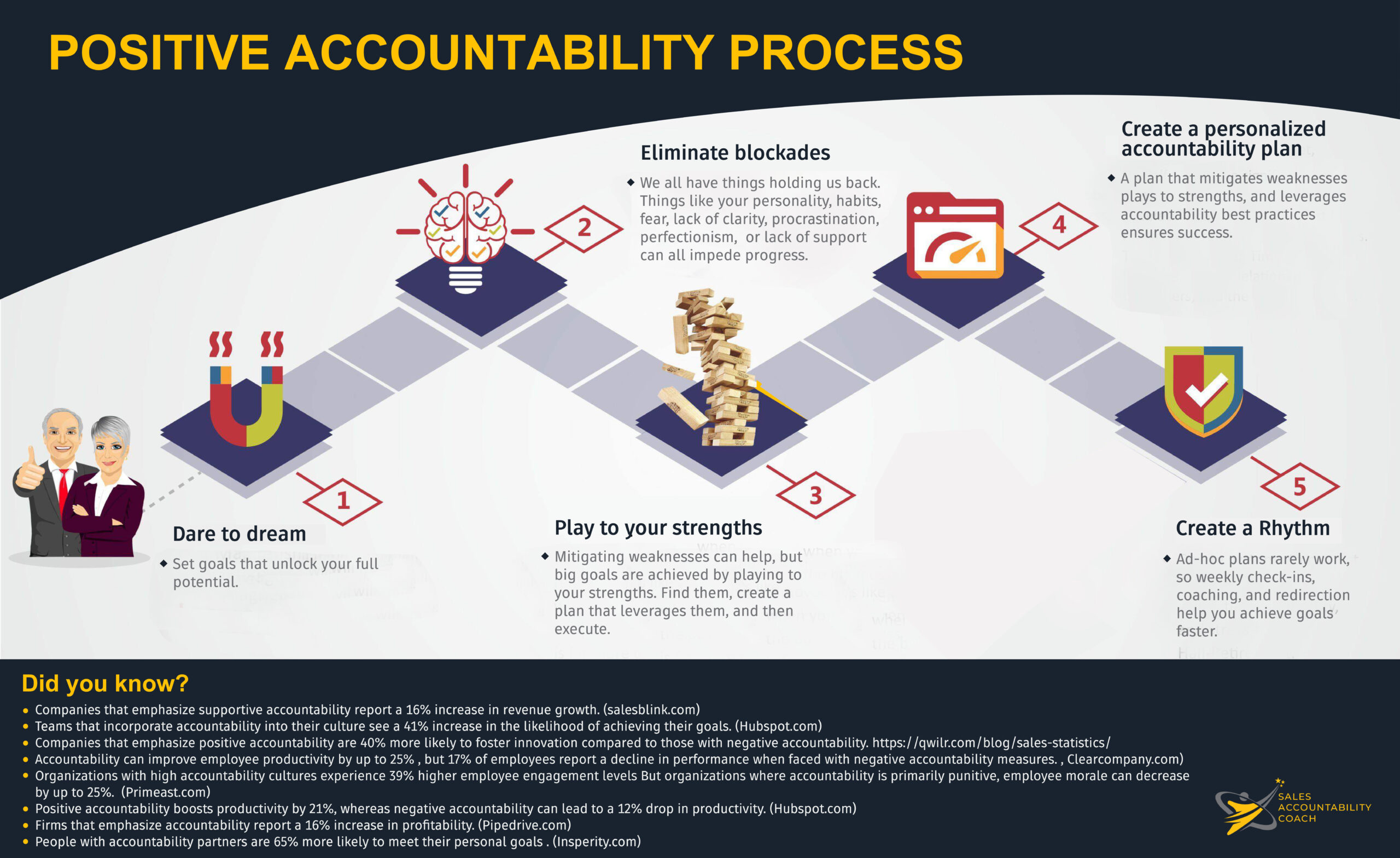Productivity comes from a system, not working harder.
Salespeople are hard drivers by nature, but sometimes that works against you. Without a proven system, it’s hard to stay consistently productive.
Below you can see our five-step accountability process. This proven process creates better results without the negative aspects of traditional accountability.

Accountabilty Stats
The core of our service, genuine human accountability—delivered by a dedicated pro on a weekly basis—is one of the most performance-boosting goal accomplishment interventions available.
The stats regarding accountabilty are undeniable:
- Connection with others and social accountability is an essential condition for intrinsic motivation in Self-Determination Theory. (Ryan & Deci, 2000)
- Ongoing accountability support increases the probability of goal accomplishment to 95 percent. (Harkin et al., 2016)
- Just the knowledge of the possibility of impending accountability check ins increases positive behaviors by 50%. (Oussedik et al., 2017)
- Virtual, weekly accountability check-ins conducted by skilled facilitators more than doubles adherence to plans to achieve goals. (Oussedik et al., 2017) (Kast & Pomeranz, 2014)
- Accountability is so powerful because it is an evolutionary trait that has evolved over millions of years hand in hand with self-awareness and our ability to self-regulate, which gives human beings the unique ability to dominate the planet. (Scheier & Carver, 1977) (Silvia, 2002)

Goal Specificity Matters
Optimizing the specifics of your implementation plan is a key focus for your coach during your weekly planning ritual. Doing so is proven to improve performance and accomplishment dramatically.
- Difficult goals, when they’re stated with clear specificity, consistently lead to higher performance. (Locke & Latham, 1990)
- Specificity optimized goals always outperform, are more unconsciously motivating and build mastery faster than purely focusing on the long term. (Bandura & Schunk, 1981)
- Balancing big picture vs ultra-detailed goals is a skill that actually improves self control, correlating with higher earning potential, better health and even better relationships. (Fujita, 2008)

Measurement Keeps You On Track
Designing a scoreboard tracking system for abstract or complex goals is a key focus of your coach during their facilitation of the weekly planning ritual. Applying this approach to planning improves performance and form habits that lead to positive outcomes.
- Measurement invokes self-awareness, which inspires us to perform at our best. (Scheier & Carver, 1977) (Wicklund & Duval, 1971)
- For goals to be effective, people need to measure progress in relation to their goals. (Locke & Bryan, 1969) (Matsui et al., 1983)
- Measuring—and staying conscious of—your progress against an intended goal activates the insula region of your brain when you deviate, which correlates with motivation to get back on track. (Knutson et al., 2007)

Deadlines Lock In Performance
Specifying your implementation plan during weekly planning will amplify your effectiveness and follow through.
- Adding a specific intention to take action at a precise time more than doubles the likelihood of a goal being accomplished. (Milne et al., 2002)
- The skillful ability to plan one’s work across time correlates with better performance in every measure, regardless of field. (Snider et al., 2021) (Fishbach et al., 2003)
- Deadlines actually help people be more flexible, resist distraction and achieve more (than just executing in a wide open schedule). (Gollwitzer & Sheeran, 2006)

Want to learn more?
Or check out our blog for additional topics.
